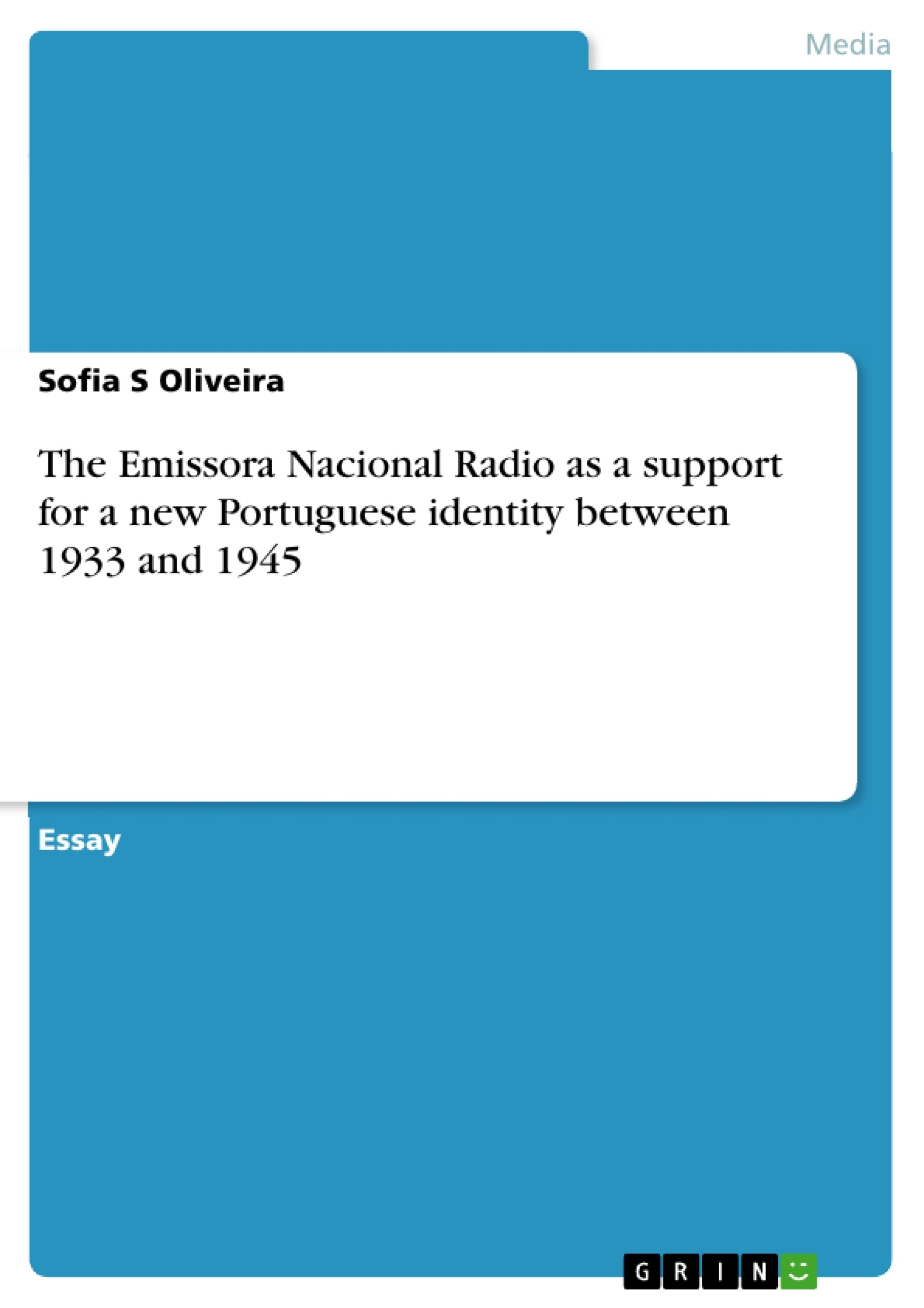The 16 years of the first Republic in Portugal was an era of political instability. In 1926 the political scenario of the country completely changed. Due to the 28th May Revolution, a military government of nationalist nature and anti-parliamentary was established. So it started a National Dictatorship, later known as the New State (Estado Novo). This dictatorship only came to an end on the 25th April 1974, when a military coup overthrew the government. The Radio would then play an important role in giving light to the revolutionary act and ending that period of 48 years of dictatorship.
This essay will attempt to find out how National Radio, the very first Portuguese national broadcasting radio, was serving the political regime as an ideological channel of the New State between 1933 (when it was first created) and 1945 (by the end of Second World War).
Inhaltsverzeichnis (Table of Contents)
- The Emissora Nacional Radio as a support for a new Portuguese identity between 1933 and 1945
- António Oliveira Salazar and the New State
- Censorship and the Construction of a Collective Social Memory
- The Secretariat of Propaganda National (SPN)
- The Role of National Radio in the New State
- National Radio and the Secretariat of National Propaganda
- The New State and the Use of Radio
Zielsetzung und Themenschwerpunkte (Objectives and Key Themes)
This essay explores the role of the Emissora Nacional Radio (National Radio) in promoting the political ideology of the New State in Portugal between 1933 and 1945. It examines how the radio station, as a key communication tool, served as a channel for the regime's propaganda and its efforts to shape a new national identity.
- The influence of the New State on Portuguese society
- The role of censorship in controlling information and shaping public opinion
- The use of radio as a tool for propaganda and shaping national identity
- The relationship between the political regime and the media
- The evolution of the New State's approach to radio broadcasting
Zusammenfassung der Kapitel (Chapter Summaries)
- This chapter provides an overview of the political context in Portugal leading to the establishment of the New State in 1933. It outlines the key events and factors that contributed to the rise of the dictatorship, setting the stage for the subsequent analysis of the role of radio in this regime.
- This chapter focuses on the legal framework established for censorship during the New State, highlighting how it restricted freedom of expression and controlled the flow of information. The chapter analyzes the impact of this censorship on the media, particularly on radio broadcasting.
- This chapter examines the establishment and functioning of the Secretariat of Propaganda National (SPN), a key institution in the regime's efforts to promote a new national identity and control public opinion. The chapter explores how the SPN utilized radio and other media to spread its ideology.
- This chapter discusses the evolution of the New State's approach to using radio as a tool for propaganda. It examines the different strategies employed by the regime, highlighting both the limitations and the effectiveness of radio as a medium for shaping public opinion.
- This chapter delves into the relationship between the Secretariat of National Propaganda and National Radio, highlighting the tensions and disagreements between António Ferro, the leader of the SPN, and António Oliveira Salazar, the Prime Minister. The chapter analyzes the different views on the role of radio in the New State's propaganda strategy.
- This chapter explores the broader context of the New State's use of radio, highlighting the regime's focus on promoting traditional values and rural life as a means of strengthening national unity. The chapter discusses the limitations of the regime's approach to using radio for propaganda.
Schlüsselwörter (Keywords)
The key themes and concepts explored in this essay include: the New State, censorship, radio broadcasting, propaganda, national identity, public opinion, António Oliveira Salazar, António Ferro, Secretariat of Propaganda National (SPN), Emissora Nacional Radio, and Portuguese culture.
Frequently Asked Questions
What was the role of the Emissora Nacional during the New State?
It served as the first Portuguese national broadcasting radio and acted as an ideological channel to promote the regime's propaganda and national identity.
How did censorship affect Portuguese radio between 1933 and 1945?
Censorship restricted freedom of expression and controlled the flow of information to help construct a collective social memory aligned with the dictatorship.
What was the Secretariat of Propaganda National (SPN)?
The SPN was a key institution led by António Ferro that utilized radio and other media to spread the ideology of the New State.
What values did the New State promote through radio?
The regime focused on promoting traditional values, rural life, and a unified national identity to strengthen political stability.
Who were the key figures in the conflict over radio propaganda?
The essay highlights disagreements between Prime Minister António Oliveira Salazar and the propaganda chief António Ferro regarding the strategic use of radio.
- Citation du texte
- Sofia S Oliveira (Auteur), 2009, The Emissora Nacional Radio as a support for a new Portuguese identity between 1933 and 1945, Munich, GRIN Verlag, https://www.grin.com/document/156107



